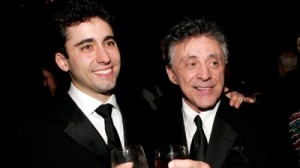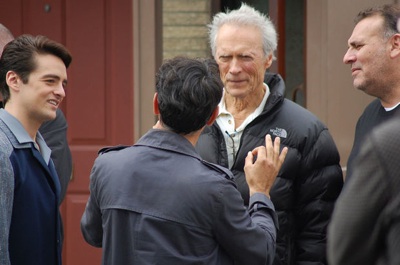Inevitably, Jersey Boys, the king of Broadway’s biography-based “jukebox musicals,” has become a movie. Less expected is that producer-director Clint Eastwood, who is old enough to have first-hand knowledge of jukeboxes, has brought it to the screen. This is only startling on the surface, however–Eastwood directed the biopic Bird (1988), produced a Tony Bennett TV concert, and has had a hand in documentaries about, among others, Dave Brubeck, Thelonious Monk, and Johnny Mercer. Songbook standards and country tunes course through many of his films, a number of which he’s written music for, and performed music in. It was his involvement in the costly Paint Your Wagon (1969), a flop Broadway adaptation, that set him on the course toward responsibly budgeted movies, like Jersey Boys, which wouldn’t pay for a single Transformer.
 The economy is pleasing, and for an hour or so Jersey Boys hums along. The Tony-winning show, packing them in on Broadway since 2005, whips you through a Scorsesean combination of Mean Streets and American Bandstand. All Four Seasons take turns narrating their rags to riches to rags again story. Dominating the mic is Tommy DeVito, a hot-headed motormouth who conceives of a group as a way out of bottom-rung lives near Newark. He brings in bass singer Nick Massi, who also plays bass guitar and, frequently, fall guy to Tommy’s scheming. Insulated from much of these wiseguy antics is Frankie Castelluccio, the anchor of the group, whose falsetto tenor brings tears to the eyes of local mob boss Gyp DeCarlo. But a one-step forward, two-steps-backwards approach to career, punctuated by capers and short stretches in jail, doesn’t lead to much until songwriter Bob Gaudio, backed by a No. 3 hit (“Short Shorts”) and industry connections, joins what was a struggling trio and zooms the quartet (named after a Jersey cocktail lounge) into the rock stratosphere with hits like “Sherry,” “Big Girls Don’t Cry,” and “Walk Like a Man.” And who introduced Bob, who hails from the right side of the tracks, to his bandmates? None other than Goodfella-to-be Joe Pesci, a “talent scout” and bowling alley attendant in the early 60s. Think a super episode of VH1 Behind the Music, salted with plenty of R-rated language, as Frankie “Vally” (later “Valli”), a loyal confederate trying to define himself as an artist, pays for Tommy’s spendthrift sins as his family life disintegrates.
The economy is pleasing, and for an hour or so Jersey Boys hums along. The Tony-winning show, packing them in on Broadway since 2005, whips you through a Scorsesean combination of Mean Streets and American Bandstand. All Four Seasons take turns narrating their rags to riches to rags again story. Dominating the mic is Tommy DeVito, a hot-headed motormouth who conceives of a group as a way out of bottom-rung lives near Newark. He brings in bass singer Nick Massi, who also plays bass guitar and, frequently, fall guy to Tommy’s scheming. Insulated from much of these wiseguy antics is Frankie Castelluccio, the anchor of the group, whose falsetto tenor brings tears to the eyes of local mob boss Gyp DeCarlo. But a one-step forward, two-steps-backwards approach to career, punctuated by capers and short stretches in jail, doesn’t lead to much until songwriter Bob Gaudio, backed by a No. 3 hit (“Short Shorts”) and industry connections, joins what was a struggling trio and zooms the quartet (named after a Jersey cocktail lounge) into the rock stratosphere with hits like “Sherry,” “Big Girls Don’t Cry,” and “Walk Like a Man.” And who introduced Bob, who hails from the right side of the tracks, to his bandmates? None other than Goodfella-to-be Joe Pesci, a “talent scout” and bowling alley attendant in the early 60s. Think a super episode of VH1 Behind the Music, salted with plenty of R-rated language, as Frankie “Vally” (later “Valli”), a loyal confederate trying to define himself as an artist, pays for Tommy’s spendthrift sins as his family life disintegrates.
 Eastwood retains the structure of the show, which is as much a play with music as it is a musical, and has cast it well. Tommy was dogged, incorrigible, and a pain in the ass, and Vincent Piazza lets it all hang out as he implodes over the hitmaking years. Retained from touring productions of the show, Michael Lomenda (Nick) and Erich Bergin (Bob) play their parts with authority and charm. Joe Pesci himself (ably played by Joey Russo) would have been a trip as Gyp but the part has gone to the movie’s only notable, Christopher Walken, exuding old world gravitas (and a few amusing Walkenisms). Like Piazza, Mike Doyle is unrestrained as Bob Crewe, the group’s, ahem, “flamboyant” record producer and co-writer, but the portrayal is true to the band’s reaction to him as an exotic Manhattan species. It’s not that often that a Tony-winning actor gets to play his part on film, and it’s not always a good idea in any case; by the time they reunited for the movie, the cast of Rent was so old the 2005 screen version might have been renamed Mortgage. Successfully modulating his stage triumph for the camera, 38-year-old John Lloyd Young underplays beautifully as Valli, and takes him convincingly from his teens to his mid-50s, when the group, much heavy water under the bridge, reunites for a last hurrah at their induction into the Rock and Roll Hall of Fame. The song and dance numbers, staged again by Sergio Trujillo and filmed live, are terrific, and they’re plentiful as fortune shifts in the group’s favor.
Eastwood retains the structure of the show, which is as much a play with music as it is a musical, and has cast it well. Tommy was dogged, incorrigible, and a pain in the ass, and Vincent Piazza lets it all hang out as he implodes over the hitmaking years. Retained from touring productions of the show, Michael Lomenda (Nick) and Erich Bergin (Bob) play their parts with authority and charm. Joe Pesci himself (ably played by Joey Russo) would have been a trip as Gyp but the part has gone to the movie’s only notable, Christopher Walken, exuding old world gravitas (and a few amusing Walkenisms). Like Piazza, Mike Doyle is unrestrained as Bob Crewe, the group’s, ahem, “flamboyant” record producer and co-writer, but the portrayal is true to the band’s reaction to him as an exotic Manhattan species. It’s not that often that a Tony-winning actor gets to play his part on film, and it’s not always a good idea in any case; by the time they reunited for the movie, the cast of Rent was so old the 2005 screen version might have been renamed Mortgage. Successfully modulating his stage triumph for the camera, 38-year-old John Lloyd Young underplays beautifully as Valli, and takes him convincingly from his teens to his mid-50s, when the group, much heavy water under the bridge, reunites for a last hurrah at their induction into the Rock and Roll Hall of Fame. The song and dance numbers, staged again by Sergio Trujillo and filmed live, are terrific, and they’re plentiful as fortune shifts in the group’s favor.
But a book, even a funny, profane one, like Marshall Brickman and Rick Elise’s Tony nominee, isn’t a script. For us to feel loss as Valli’s wife and daughter go down the tubes during his non-stop touring we need to know more about them, and they’re ciphers. Minus the abstraction of the musical, the movie, in its second hour, bogs down in thinly written scenes and glum naturalism, an Eastwood tendency. (Thankfully, he instructed his DP, Tom Stern, to go easy on the blacks and settle on a brown-gray “nostalgia” palette, conscious that this one’s for an audience and not the selection committee of the New York Film Festival.) Speaking as someone who, like Valli, was born in Belleville, NJ, I wanted more of that acrid “Jersey” atmosphere, which the show gives you in spades. Shot mostly in Vancouver and Hollywood, with a stray mountain or two in the background or so I’ve read, the movie is a little clean-shaven.
Yet, just as we’re tiring, as we’re inclined to do when Eastwood films wobble in tone or repeat themselves (has anyone watched Bird twice?), Jersey Boys dispenses with the old-age getups and other crutches of the biopic and concludes with a rousing “encore” of “December 1963 (Oh, What a Night),” performed not on a stage or before a camera as the other numbers are but as a big, old-fashioned showstopper, with the entire cast. It’s rousing, and a needed lift–just when Jersey Boys needs a showman most, the 84-year-old filmmaker steps up, and delivers.





Comments